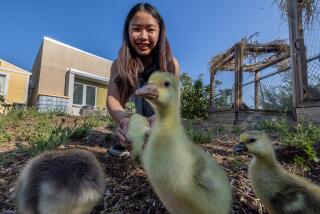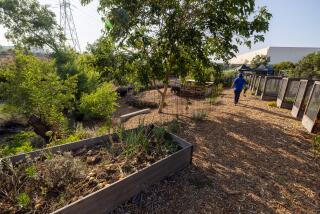Sowing Home-Grown Education
As a college student, Marcos Aguilar joined a hunger strike to help establish a Chicano studies department at UCLA. The goal: to offer Mexican American students an environment and courses sensitive to their cultural background.
As a schoolteacher a decade later, his effort to found a charter school did not require such dramatic tactics.
But when he opens up a former Masonic Lodge in El Sereno as an elementary school for 160 children in September, the Academia Semillas del Pueblo will mark the second chapter in Aguilar’s efforts to provide education that embraces the students’ heritage.
The six founders of Semillas include Aguilar’s wife and elementary schoolteacher, Minnie Ferguson, and UCLA history professor Juan Gomez Quinones--and others involved in the high-profile battle that led to the founding of the Cesar Chavez Center for Chicana and Chicano Studies.
“Organizing the charter school after having organized the Chicano studies center,” said Aguilar, 32, “is kind of like picking up where we left off.”
Academia Semillas del Pueblo--Seeds of the Town Academy--will be the first start-up, independent charter school on the Eastside under the Los Angeles Unified School District.
The academy presents the founders, dissatisfied with public schools, a chance to provide a quality education in a part of the city riddled with low-performing elementary and high schools.
Their “alternative, community-based and culturally sensitive” approach to education will focus on learning being “purposeful, social and transformative,” said Aguilar, who last taught social studies at Garfield High School.
Highlights of the system include teaching four languages. Besides the English reading, writing and math standards required by law, Spanish, Mandarin and Nahuatl--an indigenous language once spoken by people throughout the Southwest and Mexico--will also be taught.
The academy will also nurture critical thinking skills that incorporate indigenous ways of looking at the world, which is the heritage of many of the students in the mostly Latino community, Aguilar said.
For instance, Aguilar said, the indigenous ideal of everyone in a community participating in its governance will be practiced at the academy: It will count heavily on parents’ advice on key decisions about the school’s curriculum and direction.
“We are not following something we bought and paid for two months ago with a grant,” he said. “What we are developing is a living, breathing way of teaching as a community.”
Despite emphasizing a culturally sensitive approach to education, the key mission of the school, to nurture high performers who can succeed in college, is not lost on Aguilar.
“We are not going to sacrifice the success of the school by getting lost in a touchy-feely kind of thing,” he said.
To found the school, the academy’s founders raised about $2 million in public and private funding over the last three years from sources including the state Department of Education and the National Council of La Raza.
As one of the requirements to get the charter approved by state and local school district authorities, Aguilar got eight like-minded teachers to commit to teaching at the academy. Distributing fliers and visiting community events, they’ve kept a list of parents interested in enrolling their children.
For some parents, the appeal of the school is its focus on culturally sensitive instruction.
“I think that is a big advantage for the children, not to lose our roots,” said Martha Patricio, who is considering enrolling her 7-year-old daughter, Perla.
Aguilar said some of the academy’s teachers and founders will enroll their children in the academy. His 3-year-old son and 5-year-old daughter will attend.
The academy will open Sept. 3 with kindergarten through third grades. The school plans to add 40 new students each year until it has all the grades up to eighth.
A typical day might open with a social activity involving the whole school, such as martial arts exercises, singing or performing Chinese or Aztec dances celebrating “Mother Earth.”
This “would give us a sense of unity: We are here to learn,” said Maria Isabel Rodriguez, one of the academy’s teachers who has taught in L.A. Unified for almost three decades. “It would help us come in touch with our inner selves, find balance between mind and body.”
The school then would break up into eight classes, each containing one teacher and 20 students of all ages between kindergarten and third grade.
Some ideas the academy will use are not rocket science, Aguilar said, such as a small ratio of students per teacher.
But some of its techniques that are not typical of L.A. Unified protocol include children of four different grades learning together and teachers teaching the same students for four years.
This setup illustrates the academy’s goal of making education social: Older children will help teach kindergarteners how to read.
But the teachers’ job will not end in the classroom. Aguilar sees them as “organizers” of the 20 families represented in their classrooms.
“We believe that everything has to come from the needs of the students,” Rodriguez said.
Indeed, the parents’ involvement in the school is so key that another teacher, Abel Aguilar--Aguilar’s brother--may be a full-time community “educator,” updating parents about school business, such as the budget.
Another way to understand the concept of the school, said Aguilar, walking through the empty school building, is to listen to its name: Seeds of the Town Academy.
“The whole point of our school is that it be a part of the community,” he said. “We have to produce something that goes beyond the building.”
More to Read
Sign up for Essential California
The most important California stories and recommendations in your inbox every morning.
You may occasionally receive promotional content from the Los Angeles Times.










